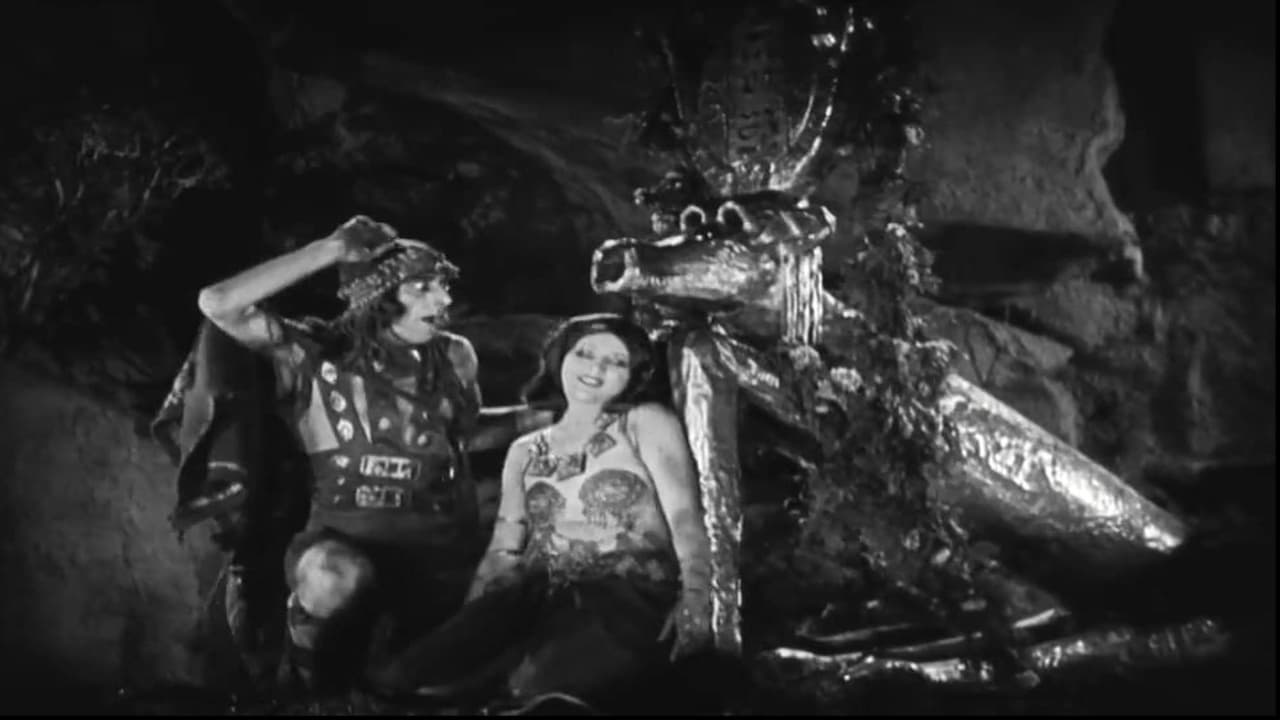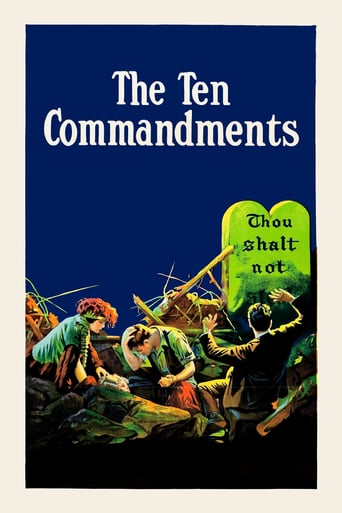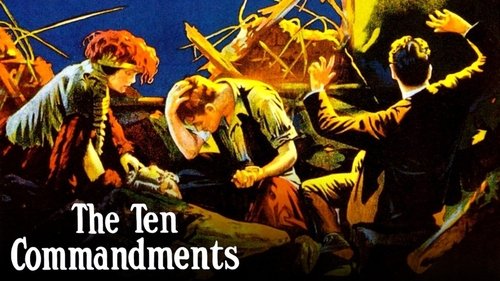


Going on 90 years since it was first released, the original The Ten Commandments can still overawe you with the spectacle of both the biblical prologue and the modern story. Modern in the sense that it was set during the Jazz Age Roaring Twenties, the 1923 when Paramount released what would become that studio's biggest moneymaker up to that time.You'll recognize the biblical prologue if you've seen the 1956 remake, it is almost a 45 minute scene for scene remake of the time that Charlton Heston and John Carradine arrive at the Egyptian court until the destruction of the Golden calf. They weren't giving Oscars back in 1923, but the parting of the Red Sea was incredible for its time and would have given Cecil B. DeMille yet another Oscar for the same event.You won't recognize a lot of the biblical prologue cast, but they were part and parcel of a DeMille stock company that he developed during silent era and continued to a lesser degree after the coming of sound. Best known probably was Estelle Taylor who was married to Jack Dempsey at the time as Miriam, the sister of Moses. The bulk of the film is the modern story which has the theme break the Ten Commandments and they'll break you. The stars are Richard Dix and Rod LaRocque a pair of brothers, one good and one bad, sons of a most pious mother Edythe Chapman. Dix is a good, honest, and steady carpenter by trade and LaRocque through his ruthlessness and who winds up breaking all the Commandments becomes the richest contractor in the state. LaRocque is pretty ruthless in his private affairs, he breaks the Commandments regarding those as well. He marries Leatrice Joy who Dix likes as well, but then gets a fetching Eurasian mistress in Nita Naldi. Nita is in the slinky and sexy tradition of all DeMille's bad girls. It all ends really bad for LaRocque as his sins catch up with him. During the modern story DeMille hand with spectacle is a good one in the scene of the church collapse and later on during the climatic escape LaRocque is attempting to make with a speedboat on a stormy night at sea.The influence of DeMille's educator father Henry and his friend David Belasco are strong here as they are in all DeMille work. The modern story is the kind of morality play that Belasco would produce and write for the stage for years. It's from the Victorian era, but the Roaring Twenties audience wanted something that reflected traditional values occasionally as if nervously waiting for its excesses to catch up. It's partly the reason why they could find comfort in a Congregationalist president of the USA in Calvin Coolidge. Though the story is unbelievably dated, DeMille's cinematic techniques are hardly that. The original Ten Commandments in many ways will tell you about its creator warts and all.
... View MoreDeMille's silent version of THE TEN COMMANDMENTS is really two films in one - specifically, a 90-minute feature introduced by a 45-minute prologue. The prologue is the familiar story of Moses (Theodore Roberts) and the Exodus from Egypt which plays like a rough sketch of the 1956 remake. As is typical of the silent DeMille oeuvre, a moral lesson is presented by juxtaposing two stories with parallel themes from widely different eras. The lessons here seem to be: ignore the Ten Commandments at your peril and love God. Just as the ancient Israelites suffered for their sins, the protagonist of the modern story (Rod LaRocque as a contractor who becomes wealthy by deceitful business practices) pays dearly for breaking one Commandment after another, and if ever there was an actor born to break them it was the sleek, devilishly handsome LaRocque. In this plot, he is pitted against his opposite: his own brother, the rough-hewn Richard Dix as an honest carpenter who plays by the rules and stays poor. The self-sacrificing Dix is so good-hearted that he gives up the woman he loves (Leatrice Joy) because he knows she loves LeRocque. Nita Naldi appears briefly and unforgettably as a leprous Eurasian vamp who plays a pivotal role in LaRocque's downfall.The prologue's special effects look crude by modern CGI standards but God's utterance of the Commandments in the form of shimmering titles against a whirl of sparks has a stylish beauty all its own, and the choreography of the Golden Calf worship looks as if it might have inspired Fritz Lang's crowd scenes in METROPOLIS a few years later. Charles DeRoche (whatever happened to HIM?) is impressive as Pharaoh Rameses.The feature benefits from excellent production values, generally fast pacing and stunning cinematography; the organ accompaniment is even above par, with imaginative use of the instrument. One problem: when characters come indoors after having been drenched to the bone in driving rainstorms their clothing appears to dry off way too quickly. And when Leatrice Joy steals a "hot dog" (which looks more like a hamburger) from a diner, and runs for blocks with it in the drenching rain, it seems to stay intact. It is also hard to believe that a woman could emerge, dressed in a full street suit, including hat and veil, from a trans- Pacific journey inside a sack of jute! But hey – this is the world of silent cinema.
... View MoreDeMille's first attempt at the story of Moses has more in common with such other silent films contrasting the ancient past to stories of today, than it does to his later epic retelling of the story. Griffith's "Intolerance" 7 years earlier had intercut several stories of sin and violence to show that the more man changes, the more he stays the same; Fritz Lang's "Destiny" and Carl Dreyer's "Leaves from Satan's Book" (both 1921) also worked out biblical themes in both ancient and modern contexts. All four directors were at one point or another quite serious Christians, though DeMille seems to have been the most obsessive in his faith, and certainly his many films on Biblical themes are often more obvious and blunt in their attempts at pedagogy.Which is not to say that "The Ten Commandments" is just a lesson in "thou shalt nots"; but it is throughout informed of a very deep, and perhaps naive faith that the stories of the past are alive and exactly transferable to the lives we have today. In this case, we see a man break essentially every commandment in his quest for personal greatness, destroying in the process his own life and those of many around him, including his own mother. DeMille doesn't intercut multiple story lines like his predecessors, but rather uses the Biblical story as a 50-minute "prologue" to one feature-length story taking place in modern-day Los Angeles.It's fascinating to watch the film if you've just watched the later version, as I did; the prologue is almost exactly the same as the last 50 minutes of the '56 version, picking up in the middle of the plagues that Moses has set upon Egypt. Like the later film, only the killing of the first-born is given significant play, and the majority of this section is given over to the flight from Egypt, the parting of the Red Sea (jello!) and destruction of the pursuing Egyptians, and the creation of the Ten Commandments and Moses' fury at the idolators. It's all very well done, in many respects more thrilling and powerful than in the later film, with many scenes that DeMille obviously liked enough to re-do almost shot-for-shot - the flight of the Israelites from the Egyptian city, and in particular the shot of Moses standing in front of them exhorting them to flee are good examples. Theodore Roberts was 62 when the film was made and looks a bit crazy and obsessive - he certainly feels more like the older Moses to me than Charlton Heston, though Charles de Rochefort doesn't leave a huge impression as Rameses. All in all, it's quite a spectacle and segues nicely into...The modern-day story, of two carpenter/architect brothers, one ambitious and unscrupulous and the other honest and devoted to their saintly, Bible-reading mother, and how they vie for the love of a vagrant girl who comes to their doorstep, is obviously freighted with the weight of the prologue: the two brothers quarrel over God, there is honoring and not honoring of the parent, coveting of the neighbor's (or brother's) wife, stealing, etc. The central theme couldn't be more obviously stated as they build a cathedral, which ultimately collapses due to the bad brother's cheap materials, killing someone dear. Every commandment gets tested and broken at one point or another, but what's fascinating is how seamlessly they're all woven into a relatively simple story and how DeMille refuses to cast the "bad" brother as completely evil, or the "good" brother as entirely strong and virtuous. Only the mother comes across as something of a caricature. Nicely lit and shot throughout - the rain sequence where the girl first comes to the home of the family is very real and moving, and only the scenes involving the unscrupulous brother's mistress seem at all overwrought. This is overall a more graceful and disciplined film than the later version, or any of DeMille's work that I've seen so far.
... View Morethis is the first film version of The Ten Commandments.it is directed by Cecil B.Demille,who also directed the 1956 version.this version is very lean,going through the events of that time,very quickly.in 50 minutes,in fact.i'm guessing they just kept the essentials of the story,without anything extra.the special effects are quite something for that day.the film must have been a grand undertaking.the remaining 80 minutes or so is a morality play set in more modern times(around 1923,i'm guessing)concerning how the Ten Commandments relate to modern life,and what happens if we don't obey them.for me,this second half is just way too heavy handed and preachy.the message is a good one,but it feels like you're being hit over the head with sledgehammer.some of the acting may seem a bit exaggerated,but they had to act that way,since they didn't have sound.there is an orchestral accompaniment,that plays through out the film.the only problem is,i found the music too repetitive.it got annoying after awhile.still,considering that this movie was mad in 1923,it's not too bad.my vote for The Ten Commandments(1923)is a 6/10
... View More